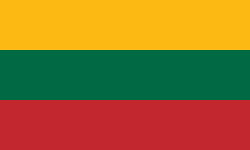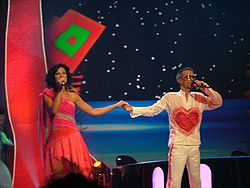Top Qs
Timeline
Chat
Perspective
Lithuania in the Eurovision Song Contest
From Wikipedia, the free encyclopedia
Remove ads
Lithuania has been represented at the Eurovision Song Contest 25 times since its debut in 1994, where "Lopšinė mylimai" performed by Ovidijus Vyšniauskas finished last, receiving "nul points". Lithuania withdrew from the contest, not returning until 1999. The sixth-place finish of the song "We Are the Winners", performed by LT United, in 2006 is Lithuania's best result in the contest. The country reached the top ten for a second time in 2016, when "I've Been Waiting for This Night" by Donny Montell finished ninth, and for the third time in 2021, finishing eighth with "Discoteque" by The Roop. The Lithuanian participating broadcaster in the contest is Lietuvos nacionalinis radijas ir televizija (LRT).
As of 2025, Lithuania remains the only Baltic country that is yet to win the contest after wins for Estonia in 2001 and Latvia in 2002. However, since the introduction of the semi-final round in 2004, Lithuania has the most final appearances in comparison to other Baltic nations, with fourteen, compared to eleven for Estonia and eight for Latvia.
Remove ads
Participation
Lietuvos nacionalinis radijas ir televizija (LRT) has been a full member of the European Broadcasting Union (EBU) since 1 January 1993, making them eligible to participate in the Eurovision Song Contest since then. It has participated in the contest representing Lithuania since its 39th edition in 1994.
History
Summarize
Perspective
2000s
Having been relegated from the 2000 contest, Lithuania returned in 2001 with "You Got Style" by Skamp, the first Lithuanian song to include English. They received 35 points, placing 13th. However, the following year, Aivaras could only manage to come second-to-last with 12 points.
Since the semi-finals were introduced, Lithuania again came last with Laura and the Lovers and "Little by Little". The following year, the Lithuanian broadcaster Lietuvos nacionalinis radijas ir televizija (LRT) sent LT United to the 2006 contest with the football chant-like song "We Are the Winners". They took Lithuania to the final for the first time since 2002, coming sixth in the final with 162 points, Lithuania's best placing as of 2025.
The following year, Lithuania automatically qualified for the final; however, 4Fun could not replicate LT United's success, coming 21st with only 28 points, 12 of which came from Ireland. In 2008, Jeronimas Milius failed to reach the final, coming 16th out of 19 competing nations in the second semi-final.
Lithuania initially threatened to boycott the 2009 contest "if Russia continues to showcase power and ignores international law." The statement was made in reaction to Russia's actions in the Russian invasion of Georgia in 2008.[1] Culture Minister Jonas Jučas stated that it was too early to discuss the boycott since "spontaneous decisions might aggravate the efforts of diplomats" and thus make the situation worse. They did eventually participate in the 2009 contest, where they qualified from the semi-finals and received 23 points in the final, placing them 23rd.[2]
2010s
LRT announced in December 2009 that, due to a lack of necessary funds, Lithuania would formally withdraw from the 2010 Contest. However, in the event that the necessary funds of 300,000 litas (€90,000) were found, the broadcaster announced that they would attempt to continue the country's participation.[3] Ultimately, private company TEO LT provided the necessary funding and Lithuania participated in Oslo.
In 2011, Lithuania was represented by Evelina Sašenko with the song "C'est ma vie". The song qualified from the first semi-final, placing 5th with 81 points. In the grand final, Lithuania finished in 19th place with 63 points.[4]
In 2012, Lithuania qualified for the final with Donny Montell and his song "Love Is Blind", placing 3rd with 104 points. They eventually finished 14th in the Grand Final.[5]
In 2013, Lithuania qualified for the final with "Something" by Andrius Pojavis, placing 9th in the first semi-final with 53 points. In the final, he finished in 22nd place with 17 points.[6]
In 2014, Vilija didn't qualify for the final, finishing 11th out of 15 entrants in the second semi-final, scoring 36 points.[7]
In 2015, Monika Linkytė and Vaidas Baumila represented Lithuania with the song "This Time". The duo qualified from the second semi-final, finishing 7th, and ultimately placed 18th in the grand final with 30 points.[8]
In 2016, Donny Montell returned to the contest and achieved Lithuania's best result of the decade, finishing ninth with "I've Been Waiting for This Night".[9]
In 2017, Lithuania was represented by Fusedmarc with the song "Rain of Revolution". The song failed to qualify for the grand final, finishing 17th in the second semi-final with 42 points.[10]
In 2018, Ieva Zasimauskaitė achieved Lithuania's fifth top 15 result, finishing 12th with "When We're Old".[11]
In 2019, Jurij Veklenko represented Lithuania with the song "Run with the Lions". He competed in the second semi-final, placing 11th with 93 points, which was not sufficient to advance to the grand final.[12]
2020s
In 2021, Lithuania qualified for the final with the song "Discoteque" by The Roop, placing 4th in the first semi-final with 203 points. In the final, The Roop reached 8th place with 220 points, thereby achieving Lithuania's second-best result to date.[13][14][15] The Roop was previously chosen to represent the country in the later-cancelled 2020 edition with "On Fire".[16]
In 2022, Monika Liu performed her song "Sentimentai" in Lithuanian, which marked the second appearance of the language in the contest, and the first one since 1994. The song qualified from the semi-final and finished 14th in the grand final.[17]
In 2023, Monika Linkytė represented Lithuania for a second time with the song "Stay". She finished 11th in the grand final with 127 points.[18]
In 2024, Lithuania was represented by Silvester Belt with the song "Luktelk". Silvester Belt was selected through the new national final, Eurovizija.LT, and finished 14th in the grand final with 90 points.[19]
In 2025, Lithuania was represented by band Katarsis with the song "Tavo akys". They managed to get Lithuania its fifth consecutive qualification to the final. In the grand final, they finished 16th, scoring 96 points.
Remove ads
Participation overview
| 3 | Third place |
| ◁ | Last place |
| X | Entry selected but did not compete |
| † | Upcoming event |
Remove ads
Trivia
Songs by language
- English (75.0%)
- Lithuanian (17.9%)
- Samogitian (3.57%)
- Russian (3.57%)
Selection process
Remove ads
Awards
Winner by OGAE members
Barbara Dex Award
Remove ads
Related involvement
Summarize
Perspective
This section contains numerous links to pages on foreign language Wikipedias. They are shown as red links with the language codes in [small blue letters] in brackets. Click on the language code to see the page in that language. |
Delegation members

Each participating broadcaster in the Eurovision Song Contest assigns a head of delegation as the EBU's contact person and the leader of their delegation at the event. The delegation, whose size can greatly vary, includes a head of press, the contestants, songwriters, composers, and backing vocalists, among others.[24]
Heads of delegation
Heads of press
Jury members
Each participating broadcaster assembles a five-member jury panel consisting of music industry professionals for the semi-finals and Grand Final of the Eurovision Song Contest, ranking all entries except for their own. The juries' votes constitute 50% of the overall result alongside televoting.[34] The modern incarnation of jury voting was introduced beginning with the 2009 contest.[35]
Commentators and spokespersons
LRT usually broadcasts all shows in Lithuania on LRT televizija and on LRT radijas as well as online via the broadcaster's website lrt.lt. For the show's broadcast on LRT several commentators have provided comment on the contest in the local language. Darius Užkuraitis was Eurovision commentator in Lithuania as many as 19 times. He was replaced by Ramūnas Zilnys in 2021. At the Eurovision Song Contest after all points are calculated, the presenters of the show call upon each voting country to invite each respective spokesperson to announce the results of their vote on-screen.
Other shows
Stage directors
The appointed stage directors are responsible for directing the country's live performance, for camerawork and for the visuals used.[68]
Costume designers
Conductors
Tomas Leiburas was the only Lithuanian conductor in Eurovision as he conducted their 1994 entry.
Remove ads
Photo gallery
- Linas and Simona in Istanbul (2004)
- Jeronimas Milius in Belgrade (2008)
- Andrius Pojavis in Malmö (2013)
- Donny Montell in Stockholm (2016)
- Ieva Zasimauskaitė in Lisbon (2018)
- Jurij Veklenko in Tel Aviv (2019)
- Monika Liu in Turin (2022)
- Monika Linkytė in Liverpool (2023)
- Silvester Belt in Malmö (2024)
Remove ads
See also
- Lithuania in the Junior Eurovision Song Contest – Junior version of the Eurovision Song Contest.
Notes
- According to the then-Eurovision rules, the top ten non-Big Four countries from the previous year along with the Big Four automatically qualified for the Grand Final without having to compete in semi-finals. For example, if Germany and France placed inside the top ten, the 11th and 12th spots were advanced to next year's Grand Final along with all countries ranked in the top ten.
- The 2020 contest was cancelled due to the COVID-19 pandemic.
- Andrius Mamontovas was initially appointed to be the spokesperson of Lithuania in 2019, but was not able to perform the role because he was a member of the jury that year.[57] Mamontovas later announced Lithuania's points in 2021 contest.
References
Wikiwand - on
Seamless Wikipedia browsing. On steroids.
Remove ads


















